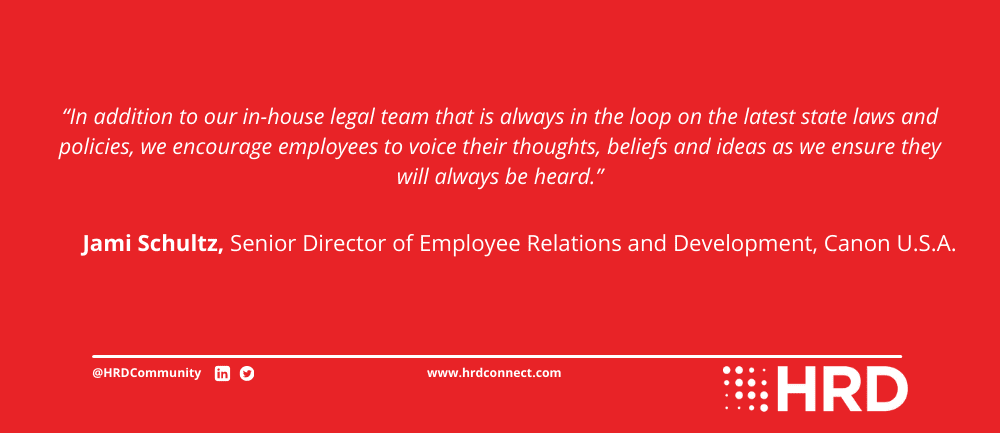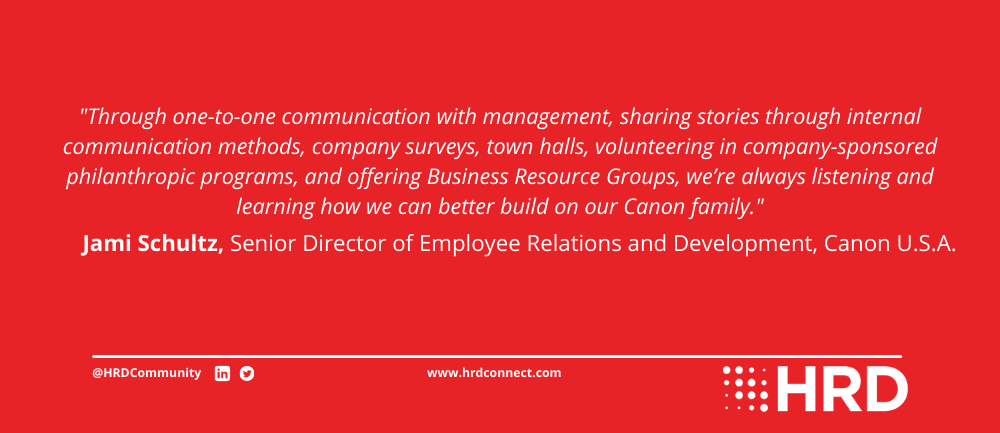-
Provided by

- Date published: Aug 14, 2023
- Categories
30-second summary:
- Discover how Canon U.S.A. balances standardization with local adaptation within the fifty states and eleven ‘separate’ nations that make up the U.S.A.
- Standardization includes company-wide access to infrastructure such as The Canon Learning Zone
- HR business partners, an in-house legal team, and Business Resource Groups pull together to deliver local adaptation based on state requirements and employee listening
Canon U.S.A. faces the task of balancing central standardization of employee relations and talent development practices from its headquarters in Melville, New York, with local adaptation for regional offices across the country. Senior Director of Employee Relations and Development Jami Schultz speaks to HRD to uncover how the digital imaging solutions company navigates cultural and legal complexities across the U.S.A.
Challenge: Standardization in one country with eleven ‘separate nations’ and fifty states
Engaging and managing an increasingly globalized workforce presents a huge challenge for HR teams operating across geographic and cultural boundaries. Notwithstanding disparate legal requirements and cultural complexities across different nations, organizations operating across the U.S.A. face huge cultural swings between states and regions.
Complex state laws are one issue; but moreover, author Colin Woodward finds the US to have 11 separate nations each with entirely different cultures.

This has presented Canon U.S.A. with the same problem facing all large organizations operating across more than one state, country, or region: Which structures and processes HR and people teams should keep consistent across all offices, and where to build flexibility into this model to account for local differences.
How Canon U.S.A. standardizes formal structures and processes
Canon embraces a corporate philosophy of “Kyosei,” which means “all people, regardless of race, religion, or culture, harmoniously living and working together into the future.”
As Senior Director of Employee Relations and Development, Schultz is responsible for ensuring every Canon U.S.A., Inc. location and employee experience shares this philosophy, whether it be in Melville, New York headquarters, regional offices across the country, or field employees serving customers.
“With any large company, ensuring a consistent employee experience can be challenging,” begins Schultz. “We have implemented formalized structures and processes to create cohesive and consistent training and employee relations practices across all Canon offices.”
Canon U.S.A has achieved this by ensuring consistent and complete accessibility to training and development resources:
- Proving accessibility to all HR policies to all employees on Canon U.S.A.’s company intranet, including all training offerings
- Operating only one expansive Learning Management System called The Canon Learning Zone
- Communicating with employees regularly about upcoming offerings in the Learning and Development space through a Talent Talk newsletter
- Creating a Business Resource Group program called PACT (Parents and Caregivers Together), equipping working parents and caregivers with resources, events, and a community to help employees balance work and home life by connecting parents and caregivers
Balancing standardization with local flexibility
While Canon U.S.A. aims to have consistency across the country so that it governs all the same regardless of where they are located, it does adapt small differences from state to state, such as how it treats paid time off or leaves of absence.
This, explains Schultz, requires HR to work closely with Canon U.S.A.’s legal team: “Whatever the case, we work closely with our in-house legal team to stay abreast of any changes to state laws so that our policies are in-line and compliant. But the overarching corporate philosophy remains consistent.”
Canon U.S.A also adopts the same approach to its training. Alongside “The Canon Learning Zone,” it must also consider local legal differences.
“There are specific states that mandate various training requirements,” says Schultz. “For example, we have a sexual harassment training course for all employees, but there may be some differences in that training course based on location as required by specific state and/or local laws.”
Schultz also emphasizes the role HR business partners play in facilitating local adaptation. “Our employee relations model is centered around designated HR business partners that represent particular regions and various business units,” she explains. “We assign all employees to one of these partners as their “go-to” person to address both common and unique concerns.”
Canon U.S.A. has seen huge success with this model. It has solved local issues such as managerial relationships, performance concerns, career development, promotions, compensation, and benefits. Having heard the concern, Canon U.S.A.’s HR business partners then bring in support as needed from Business Resource Groups, the in-house legal team, or other stakeholders. “All of that would come through the HR business partners initially, and we would then pull in expertise in other more specific areas as needed,” adds Schultz. “In addition to our in-house legal team that is always in the loop on the latest state laws and policies, we encourage employees to voice their thoughts, beliefs and ideas as we ensure they will always be heard.”
As cultural change accelerates, employee listening becomes crucial
Country-wide culture change has historically been slow but evolving. But it is no secret that cultural changes, including in the U.S.A., have accelerated in the wake of Covid-19 and other global events.
Local adaptation, therefore, becomes a vital exercise in employee listening. This ensures any program or process that Canon U.S.A. plans centrally can adapt to employee feedback from state to state and region to region. “Through one-to-one communication with management, sharing stories through internal communication methods, company surveys, town halls, volunteering in company-sponsored philanthropic programs, and offering Business Resource Groups, we’re always listening and learning how we can better build on our Canon family,” explains Schultz.
Employee engagement surveys provide Canon U.S.A. with very detailed information regarding how our employees view their work experiences as individuals, with their managers, and with their executive leaders. Engagement scores on every metric have increased from 2022 compared with 2019 based on the frameworks for local adaptation Schultz and her team have established. Canon U.S.A. is constantly for ways to enhance its employee experience based on the feedback it receives from engagement surveys. “Our ability to adapt to changing circumstances is one of the things that makes our company strong,” Schultz concludes.










